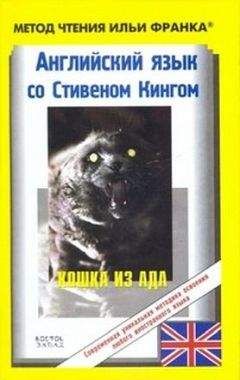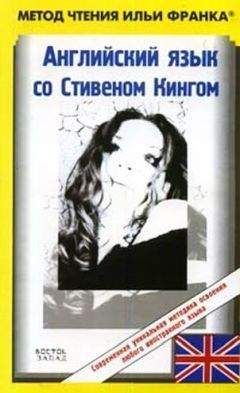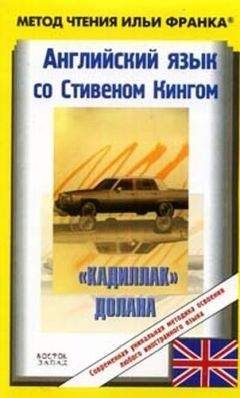Stephen King - Английский язык с Стивеном Кингом "Дети кукурузы
avert [q'vWt], utter ['Atq], strangle ['strxNgl], slither ['slIDq], clutch [klAC]
Vicky tapped him on the shoulder and he jumped.
She was standing with the brown army blanket over her left arm, the cased pump shotgun in her right hand, her face averted. He took the blanket and spread it on the road. He rolled the body on to it. Vicky uttered a desperate little moan.
“You okay?” He looked up at her. “Vicky?”
“Okay,” she said in a strangled voice.
He flipped the sides of the blanket over the body and scooped it up, hating the thick, dead weight of it. It tried to make a U in his arms and slither through his grasp. He clutched it tighter and they walked back to the T-Bird.
“Open the trunk (открой багажник),” he grunted (проворчал он; togrunt— хрюкать; ворчать; буркнуть).
The trunk was full of travel stuff (багажник был полон вещей /необходимых/ для поездки), suitcases (чемоданов) and souvenirs (сувениров). Vicky shifted most of it into the back seat (переложила большую часть /вещей/ на заднее сидение; to shift— перемещать, сдвигать; перекладывать) and Burt slipped the body into the made space (опустил тело в освобожденное: «созданное»пространство; toslip— скользить; выпускать) and slammed the trunk lid down (и захлопнул крышку багажника; slam— хлопанье /особ. дверьми/). А sigh of relief escaped him (он вздохнул с облегчением: «вздох облегчения вырвался у него»).
Vicky was standing by the driver's side door (стояла возле дверцы со стороны водителя), still holding the cased rifle (все еще держа /в руках/ зачехленную винтовку).
“Just put it in the back and get in (просто положи ее сзади и садись; togetin— входить; садиться в машину).”
He looked at his watch and saw only fifteen minutes had passed (он посмотрел на свои часы и увидел, что прошло только пятнадцать минут). It seemed like hours (казалось, прошли часы: «это показалось похожим на часы»).
“What about the suitcase (а что делать с чемоданом: «что насчет чемодана»)?” she asked (спросила она).
stuff [stAf], souvenir ['sHvqnIq], sigh [saI]
“Open the trunk,” he grunted.
The trunk was full of travel stuff, suitcases and souvenirs. Vicky shifted most of it into the back seat and Burt slipped the body into the made space and slammed the trunk lid down. A sigh of relief escaped him.
Vicky was standing by the driver's side door, still holding the cased rifle.
“Just put it in the back and get in.”
He looked at his watch and saw only fifteen minutes had passed. It seemed like hours.
“What about the suitcase?” she asked.
He trotted back down the road to where it stood on the white line (он поспешил назад к тому месту на дороге, где он /чемодан/ стоял на белой линии; trot— идтирысью; идтибыстрымимелкимишагами, торопиться), like the focal point in an Impressionist painting (подобно фокусному пятну на полотне импрессиониста; painting— живопись; картина; paint — рисование; краска). He picked it up by its tattered handle (он взял/поднял его за изорванную ручку) and paused for a moment (и остановился на секунду/миг; pause— пауза;to pause — делатьперерыв, останавливаться). He had a strong sensation of being watched (у него было сильное чувство/ощущение, что за ним наблюдают). It was a feeling he had read about in books (это было чувство, о котором он читал в книгах; toread), mostly cheap fiction (в основном в дешевой беллетристике; fiction— выдумка, фантазия; художественная литература), and he had always doubted its reality (и он всегда сомневался в его реальности). Now he didn't (но не теперь: «теперь он не делал = не сомневался»). It was as if there were people in the corn (/ощущение/ будто в кукурузе были люди), maybe a lot of them (возможно, их /было/ много; lot— жребий; серия, партия /какого-либо товара/, группа /людей/; много), coldly estimating whether the woman could get the gun out of the case (хладнокровно просчитывающих: успеет ли женщина достать ружье из футляра; cold— холодный; спокойный, уравновешенный) and use it before they could grab him (и воспользоваться ею прежде, чем они схватят его), drag him into the shady rows (утащат его в тенистые ряды), cut his throat (перережут его = ему горло) — Heart beating thickly (с бешено: «быстро» бьющимся сердцем; thickly— густо, часто; быстро), he ran back to the car (он побежал обратно к машине), pulled the keys out of the trunk lock (выдернул ключи из замка багажника), and got in (и сел /в машину/).
Vicky was crying again (Вики снова плакала). Burt got them moving (завел машину и тронулся с места; «сделал их двигающимися»), and before a minute had passed (и меньше чем через минуту: «прежде чем минута прошла»), he could no longer pick out the spot where it had happened in the rear-view mirror (он уже не мог больше разглядеть место, где все это случилось, в зеркале заднего вида; to pick out — выдергивать; отличать, различать).
tatter ['txtq], doubt [daut], estimate ['estImeIt]
He trotted back down the road to where it stood on the white line, like the focal point in an Impressionist painting. He picked it up by its tattered handle and paused for a moment. He had a strong sensation of being watched. It was a feeling he had read about in books, mostly cheap fiction, and he had always doubted its reality. Now he didn't. It was as if there were people in the corn, maybe a lot of them, coldly estimating whether the woman could get the gun out of the case and use it before they could grab him, drag him into the shady rows, cut his throat -Heart beating thickly, he ran back to the car, pulled the keys out of the trunk lock, and got in.
Vicky was crying again. Burt got them moving, and before a minute had passed, he could no longer pick out the spot where it had happened in the rear-view mirror.
“What did you say the next town was (как ты сказала, /называется/ следующий город)?” he asked (он спросил).
“Oh.” She bent over the road atlas again (она снова склонилась над дорожным атласом). “Gatlin. We should be there in ten minutes (мы будем: «должны быть» там через десять минут).”
“Does it look big enough to have a police station (он выглядит достаточно большим, чтобы в нем был полицейский участок; station— место, местоположение; пункт, станция)?”
“No. It's just a dot (это всего лишь точка).”
“Maybe there's a constable (возможно, там есть констебль; constable— низший полицейский чин в Великобритании и США; должностное лицо, отвечающее за порядок /обычно города или округа/).”
They drove in silence for a while (они ехали молча некоторое время; silence — тишина, безмолвие). They passed a silo on the left (проезжая, они увидели силосную башню с левой стороны: «они проехали мимо силосной башни слева»). Nothing else but corn (ничего больше, кроме кукурузы). Nothing passed them going the other way (ничего не повстречалось им по встречной полосе: «ничего не проехало мимо них едущее в другую сторону»), not even a farm truck (даже фермерский грузовичок).
“Have we passed anything since we got off the turnpike, Vicky (нам повстречался кто-нибудь, с тех пор как мы свернули с магистрали, Вики)?”
minute ['mInIt], enough [I'nAf], constable ['kAnstbl], silo ['saIlqu]
“What did you say the next town was?” he asked.
“Oh. “ She bent over the road atlas again. “Gatlin. We should be there in ten minutes.”
“Does it look big enough to have a police station?”
“No. It's just a dot.”
“Maybe there's a constable.”
They drove in silence for a while. They passed a silo on the left. Nothing else but corn. Nothing passed them going the other way, not even a farm truck.
“Have we passed anything since we got off the turnpike, Vicky?”
She thought about it (она задумалась: «подумала над этим»). “A car and a tractor (автомобиль и трактор). At that intersection (на том перекрестке).”
“No, since we got on this road, Route 17 (нет, с тех пор как мы выехали на эту дорогу, шоссе 17).”
“No. I don't think we have (не думаю, что мы встречали). “Earlier this might have been the preface to some cutting remark (раньше это могло бы быть прелюдией к какому-нибудь язвительному замечанию; preface — предисловие; вводная часть; пролог, прелюдия; cutting— режущий, колющий; колкий, резкий; язвительный). Now she only stared out of her half of the windshield at the unrolling road and the endless dotted line (сейчас она только смотрела через свою половину ветрового стекла на расстилающуюся /перед ними/ дорогу и бесконечную прерывистую дорожную разметку;toroll— катить/ся/, вращать/ся/; сворачивать/ся/; dot— точка; dotted— точечный; пунктирный).



